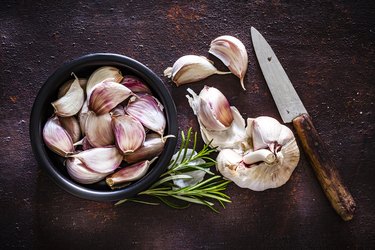
Garlic's health benefits are well documented, from boosting your immune system to serving as an anti-inflammatory and improving cardiovascular health, according to the Cleveland Clinic. But overdoing it can have very unpleasant consequences — and one of them is diarrhea.
Read more: Excuse Me, Please: Garlic Makes Me Burp
Video of the Day
Video of the Day
Garlic and Diarrhea
According to medical experts, garlic can most definitely cause diarrhea. "The reason is that garlic is quite high in a FODMAP called fructans," says Will Bulsiewicz, MD, a board-certified gastroenterologist and gut health expert at Lowcountry Gastroenterology in Mount Pleasant, South Carolina, and author of Fiber Fueled.
"These are fermentable complex carbohydrates found in the food that could contribute to digestive distress, including diarrhea but also gas, bloating and discomfort. The problems occur when we eat too much garlic all at once, so we each need to moderate our portion size according to what our gut is capable of handling," Dr. Bulsiewicz says.
FODMAP is an acronym for "fermentable oligosaccharides, disaccharides, monosaccharides and polyols," of which fructans are one type, along with other carbohydrates such as lactose, fructose and others notes Stanford Health Care.
Jason Rubinov, MD, a medical director at the Gastroenterology Center of New York and clinical instructor of medicine at the Icahn School of Medicine at Mount Sinai, explains that, when a person lacks a sufficient amount of the enzymes necessary to break the linkages between fructans, the fructans are poorly digested and make their way into the colon, where they are fermented by gut bacteria.
"During this process, water moves its way into the colon which leads to bloating and diarrhea," he says.
Intolerance to Garlic
Some people can even develop an intolerance to garlic. According to Dr. Rubinov, this occurs when a person loses the ability to break down the components of garlic due to an enzyme deficiency, in turn causing the garlic to be malabsorbed. That occurs when its nutrients cannot be fully digested and absorbed, explains Johns Hopkins Medicine.
Dr. Bulsiewicz adds that, in general, people likely to have an intolerance are those who already have digestive disorders or those who've had recent injury to their gut, caused by a virus or antibiotic use.
Is There a Remedy?
For people who are truly intolerant to garlic, Dr. Rubinov says the best method to prevent diarrhea — as well as bloating, abdominal pain and constipation — is to avoid consuming garlic.
But according to Dr. Bulsiewicz, for many people, complete avoidance is not necessary. "The most important remedy for intolerance to garlic or digestive symptoms is to moderate the portion size," he says. "There is a certain amount that each one of us is capable of tolerating, and if we exceed that amount, then we are likely to have symptoms."
He also recommends measures to support a healthy gut, such as the regularly using prebiotic and probiotic supplements and consuming a wide range of plant foods, including other veggies similar to garlic, such as onions, shallots, chives and scallions.
Read more: What Does Eating Whole Garlic Do for Your Body?
The Flip Side: Garlic Benefits
With all this talk of diarrhea and other unpleasant symptoms, you might be tempted to think garlic is bad for you. But nothing could be further from the truth. Garlic consumption has been linked to numerous health benefits, particularly in women, from maintaining blood vessel health to reducing cholesterol levels, notes Johns Hopkins Medicine.
"Garlic is one of the healthiest foods that exist," says Dr. Bulsiewicz. "It boosts the immune system while simultaneously having antibacterial, antiviral and antifungal properties. It lowers blood pressure and also reduces cholesterol, helping to protect from heart disease and stroke. It has antioxidants that help to prevent cellular aging. The bottom line is that garlic is as healthy as it is delicious, and absolutely should be enjoyed as part of a healthy diet."
Dr. Rubinov is similarly enthusiastic. "There are many known and proven benefits to garlic, and it has long been used for its medicinal properties," he says. "Its consumption has been shown to combat illness and boost the immune system's response to the common cold and flu."
"Furthermore, garlic has blood pressure-lowering abilities and can be beneficial to patients [who have] high blood pressure," Dr. Rubinov says. "Garlic has also been found to lower cholesterol and by doing so it can decrease the risk of heart disease."
Read more: Which Is Healthier, Raw or Cooked Garlic?
- Will Bulsiewicz, MD, gastroenterologist, Lowcountry Gastroenterology, Mount Pleasant, South Carolina; author, "Fiber Fueled"
- Jason Rubinov, MD, gastroenterologist, medical director, Gastroenterology Center of New York, clinical instructor of medicine, Icahn School of Medicine at Mount Sinai, New York City
- Cleveland Clinic: “6 Surprising Ways Garlic Boosts Your Health”
- Johns Hopkins Medicine: “Malabsorption”
- Johns Hopkins Medicine: “5 Spices with Healthy Benefits”
- Stanford Health Care: “Low FODMAP Diet”
Is this an emergency? If you are experiencing serious medical symptoms, please see the National Library of Medicine’s list of signs you need emergency medical attention or call 911.